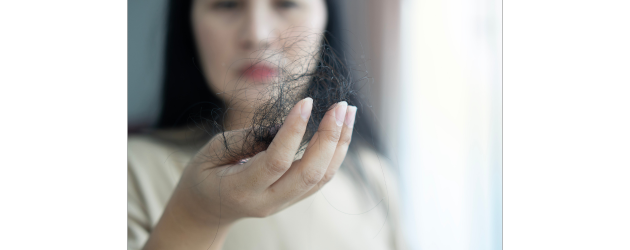The most common cause of hair loss in women is androgenetic alopecia, commonly referred to as female pattern hair loss (FPHL). This condition is often hereditary and typically leads to thinning of the hair, especially along the top of the scalp. However, numerous other potential factors can contribute to hair loss in women, including:
1. Hormonal Changes:
Shifts in hormone levels, such as those that occur during menopause, pregnancy, or due to thyroid disorders, can lead to significant hair thinning or shedding. For example, many women experience postpartum hair loss due to a sudden drop in estrogen after childbirth.
2. Medical Conditions:
• Several health conditions can directly impact hair growth. These include:
- Alopecia Areata: An autoimmune condition where the body’s immune system attacks hair follicles, leading to patchy hair loss.
- Polycystic Ovary Syndrome (PCOS): A hormonal disorder that can cause thinning hair on the scalp and excessive hair growth in other areas.
- Thyroid Disorders: Both hyperthyroidism and hypothyroidism can disrupt the balance of hormones that regulate hair growth, resulting in diffuse hair loss.
3. Nutritional Deficiencies:
A lack of essential nutrients such as iron, protein, zinc, and vitamins like Vitamin D and biotin can weaken hair and slow its growth. In severe cases, these deficiencies may lead to noticeable hair loss.
4. Stress or Traumatic Events:
Both physical and emotional stress can trigger a type of hair loss called telogen effluvium, where large amounts of hair enter the resting phase and shed all at once. Stressful life events such as surgery, illness, or emotional trauma can disrupt the normal hair growth cycle.
5. Certain Medications:
Some prescription drugs have side effects that include hair thinning or loss. These can include medications for cancer (chemotherapy), depression (antidepressants), high blood pressure (beta-blockers), and arthritis (anti-inflammatories).
6. Hairstyling Practices and Chemical Treatments:
Repeated use of heat-styling tools, tight hairstyles (e.g., ponytails or braids), or chemical treatments such as perms, relaxers, and bleach can weaken hair strands, leading to breakage and thinning over time. Traction alopecia, for instance, occurs when hair is pulled too tightly for extended periods, causing gradual hair loss.
7. Aging:
As women age, the natural hair growth cycle slows down, resulting in thinner hair. Hair may become more brittle, and the scalp may become more visible, particularly in post-menopausal women.
8. Underlying Scalp Conditions:
Skin conditions such as seborrheic dermatitis, psoriasis, or fungal infections like ringworm can affect scalp health, leading to hair loss if left untreated. Proper scalp care is essential for maintaining healthy hair growth.
By understanding the wide range of potential causes, women experiencing hair loss can better identify the root issue and seek appropriate treatments or lifestyle changes.

Hormonal Changes and Hair Loss in Women
Hormonal changes are a significant cause of hair loss in women. These fluctuations can disrupt the normal hair growth cycle, leading to thinning or shedding. Here are some common hormonal changes that affect hair health:
- Menopause:
During menopause, estrogen and progesterone levels drop, which can lead to hair thinning and loss. Estrogen helps maintain healthy hair, so its decline often results in increased hair shedding and slower hair growth. Hair may also become more brittle and prone to breakage.
- Pregnancy and Postpartum:
During pregnancy, high levels of estrogen prolong the growth phase of hair, resulting in thicker, fuller hair. However, after childbirth, hormone levels drop sharply, which can lead to postpartum hair loss. This type of hair loss is typically temporary and may last for a few months until hormone levels stabilize.
- Polycystic Ovary Syndrome (PCOS):
PCOS is a hormonal disorder that causes an imbalance of androgens (male hormones) in women. Elevated androgen levels can cause androgenetic alopecia, leading to hair thinning primarily on the top and crown of the scalp. Women with PCOS may also experience increased facial or body hair.
- Thyroid Disorders:
Both hyperthyroidism (overactive thyroid) and hypothyroidism (underactive thyroid) can disrupt the hair growth cycle, causing diffuse hair thinning across the scalp. Thyroid imbalances affect the regulation of hormones that are critical for healthy hair growth.
- Hormonal Contraceptives:
Birth control pills and other hormonal contraceptives can sometimes cause hair thinning or loss, particularly for women sensitive to changes in hormone levels. Stopping or starting these medications can affect the hair cycle, triggering temporary hair shedding.
Managing Hormonal Hair Loss:
Treatment options for hair loss due to hormonal changes include balancing hormone levels through medications or lifestyle changes, using hair loss treatments like minoxidil, or consulting a healthcare provider to address the underlying condition.
Hormonal hair loss is often reversible, especially when the underlying cause is identified and treated early. Women who suspect hormonal imbalances are contributing to hair loss should consult a healthcare provider or specialist for guidance.
Nutritional Deficiencies and Their Role in Hair Loss in Women
Nutritional deficiencies play a critical role in hair loss for women, as hair follicles rely on key nutrients to grow and thrive. A lack of these essential nutrients can lead to hair thinning, shedding, or slow regrowth. Here are some common nutritional deficiencies that contribute to hair loss:
- Iron Deficiency:
Iron is crucial for producing hemoglobin, which carries oxygen to the scalp and hair follicles. Low iron levels, or iron deficiency anemia, can lead to telogen effluvium—a condition where hair follicles prematurely enter the resting phase, causing hair to fall out more than usual.
Women, especially those with heavy menstrual cycles or who follow restrictive diets, are at higher risk of iron deficiency.
- Protein Deficiency:
Hair is primarily made of keratin, a protein. A diet low in protein can slow hair growth, weaken the hair structure, and lead to thinning. Without adequate protein, the body prioritizes essential functions over hair growth, contributing to hair loss.
- Vitamin D Deficiency:
Vitamin D plays a role in hair follicle cycling and hair production. Deficiency in vitamin D has been linked to conditions like alopecia areata and generalized hair thinning. Adequate sunlight exposure and fortified foods can help maintain healthy vitamin D levels.
- Zinc Deficiency:
Zinc is essential for hair tissue growth and repair, and it also helps maintain the oil glands around the follicles. A lack of zinc can cause hair shedding and thinning, as it disrupts the protein structure that makes up hair.
- B-Vitamin Deficiency (Biotin):
Biotin (vitamin B7) is one of the most well-known nutrients for hair health. A deficiency can lead to brittle hair, hair thinning, and hair loss. Biotin supplements are often recommended for improving hair strength and quality.
- Essential Fatty Acids (Omega-3 and Omega-6):
Fatty acids help nourish hair follicles and promote healthy hair growth. A deficiency in essential fatty acids can result in dry, brittle hair and contribute to scalp conditions that worsen hair loss.
- Other Vitamin Deficiencies:
Deficiencies in other vitamins, such as vitamin C (important for collagen production and iron absorption) and vitamin E (an antioxidant that promotes scalp health), can also negatively affect hair growth and overall hair health.
Addressing Nutritional Deficiencies:
Incorporating a balanced diet rich in whole foods like leafy greens, lean proteins, nuts, seeds, and fruits can help provide the necessary nutrients for healthy hair. In cases of severe deficiency, dietary supplements or professional consultation may be required.
Maintaining adequate nutrition is essential for supporting hair health, and addressing deficiencies can often reverse or prevent hair loss over time. Women experiencing hair loss should consider having their nutrient levels checked to identify any potential deficiencies contributing to their condition.
Medications and Hair Loss in Women: Side Effects You Should Know
Certain medications can have side effects that lead to hair loss in women. This type of hair loss, known as drug-induced alopecia, can be temporary or, in rare cases, permanent. Understanding which medications may cause hair loss and how they affect the hair cycle is important for managing this condition.
Here are some medications known to cause hair loss as a side effect:
- Chemotherapy Drugs:
Chemotherapy targets rapidly dividing cancer cells but can also affect fast-growing hair follicles. This results in anagen effluvium, a condition where hair is lost rapidly, typically within 1-2 weeks of starting treatment. Hair usually regrows after chemotherapy is completed.
- Blood Thinners (Anticoagulants):
Medications like warfarin and heparin can cause telogen effluvium, a form of hair shedding that occurs when more hairs than usual enter the resting phase. Hair loss usually begins 2-3 months after starting these medications.
- Beta-Blockers:
Drugs such as propranolol and metoprolol, commonly used for high blood pressure and heart conditions, have been associated with hair thinning. They may trigger telogen effluvium, resulting in diffuse thinning across the scalp.
- Antidepressants:
Medications like SSRIs (e.g., fluoxetine, sertraline) and tricyclic antidepressants (e.g., amitriptyline) may lead to hair shedding. This side effect is usually temporary but can be distressing if not recognized early.
- Hormonal Medications:
Oral contraceptives or hormone replacement therapy (HRT) can sometimes cause hair thinning, especially in women sensitive to hormonal changes. Switching or discontinuing these treatments can affect hair growth cycles, sometimes leading to telogen effluvium.
- Isotretinoin (Accutane):
This acne medication, which affects the sebaceous glands and reduces skin oil production, may cause hair thinning as a less common side effect.
- Antithyroid Medications:
Drugs used to treat hyperthyroidism, such as methimazole and propylthiouracil, can lead to hair loss, as thyroid levels play a critical role in regulating hair growth.
Managing Drug-Induced Hair Loss:
In many cases, hair loss caused by medications is temporary and hair will regrow once the medication is discontinued or adjusted. If you’re concerned about hair loss related to a prescribed medication, it’s important to speak with your healthcare provider. They may suggest alternatives or ways to mitigate the side effects without disrupting treatment.
Recognizing and addressing drug-induced hair loss early can help manage this side effect more effectively.
How to Diagnose the Cause of Your Hair Losss
To determine the cause of hair loss in women, a healthcare professional will typically follow these steps:
- Detailed Medical History: The provider will ask about your health background, including any past medical conditions, family history of hair loss, medications you may be taking, and lifestyle factors that could contribute to hair loss, such as diet and stress levels.
- Scalp Examination: A thorough physical examination of the scalp is conducted to assess the pattern, extent, and characteristics of hair loss. The provider may also look for signs of scalp conditions, such as inflammation, scaling, or any other abnormalities.
- Blood Tests: In some cases, the healthcare provider may recommend blood tests to identify any underlying medical issues. These tests can check for hormonal imbalances, thyroid function, nutritional deficiencies, or other conditions that might be contributing to hair loss.
This comprehensive approach helps to pinpoint the cause and guide appropriate treatment options.
Stay tuned to our blog for our next installment covering treatment options for hair loss in women.
Do you already know you need to talk to someone about your hair loss?
Use the button below to book yourself a consultation with one of our THTS experts!




